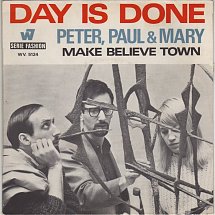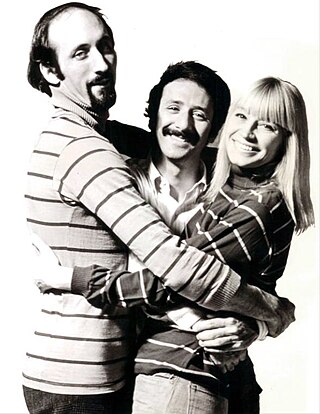
Peter, Paul and Mary were an American folk group formed in New York City in 1961 during the American folk music revival phenomenon. The trio consisted of Peter Yarrow, Paul Stookey, and Mary Travers. The group's repertoire included songs written by Yarrow and Stookey, early songs by Bob Dylan, and covers of other folk musicians. They were enormously successful in the early- and mid-1960s, with their debut album topping the charts for weeks, and helped popularize the folk music revival. After the death of Travers in 2009, Yarrow and Stookey continued to perform as a duo under their individual names. Yarrow died in 2025, leaving Stookey as the only surviving member of the trio.

"I Can't Get Next to You" is a 1969 No. 1 single recorded by the Temptations and written by Norman Whitfield and Barrett Strong for the Gordy (Motown) label. The song was a No. 1 single on the Billboard Top Pop Singles chart for two weeks in 1969, from October 18 to October 25, replacing "Sugar, Sugar" by the Archies and replaced by "Suspicious Minds" by Elvis Presley. The single was also a No. 1 hit on the Billboard Top R&B Singles for five weeks, from October 4 to November 1, replacing "Oh, What a Night" by the Dells, and replaced by another Motown song, "Baby I'm For Real" by the Originals.

"You've Really Got a Hold on Me" is a song written by Smokey Robinson, which became a 1962 Top 10 hit single for the Miracles. One of the Miracles' most covered tunes, this million-selling song received a 1998 Grammy Hall of Fame Award. It has also been selected as one of The Rock and Roll Hall of Fame's 500 Songs that Shaped Rock and Roll. It was recorded by the Beatles for their second album, With the Beatles (1963). Many other musicians also recorded versions.
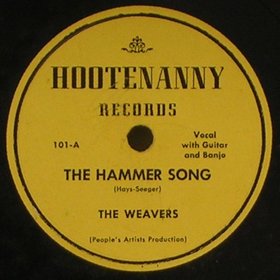
"If I Had a Hammer " is a protest song written by Pete Seeger and Lee Hays. It was written in 1949 in support of the Progressive movement, and was first recorded by the Weavers, a folk music quartet composed of Seeger, Hays, Ronnie Gilbert, and Fred Hellerman. It was a #10 hit for Peter, Paul and Mary in 1962 and then went to #3 a year later when recorded by Trini Lopez in 1963.

"Angel of the Morning" is a popular song written by Chip Taylor, originally recorded by Evie Sands but which first charted with a version by Merrilee Rush. The song has been covered by many artists including Chrissie Hynde, Dusty Springfield, P. P. Arnold, Connie Eaton, Mary Mason, Guys 'n' Dolls, Melba Montgomery, Olivia Newton-John and Juice Newton, who reached the Billboard Top Ten with her version in the early 1980s.

Peter, Paul and Mommy, released on Warner Bros. in 1969, is the trio Peter, Paul and Mary's first children's album. It contains hits like "Puff the Magic Dragon", among others. The album reached No. 12 on Billboard's Top LPs chart. The single "Day is Done" reached number 7 on the Easy Listening chart and number 21 on the Pop Singles chart.

"Proud Mary" is a song by American rock band Creedence Clearwater Revival, written by vocalist and lead guitarist John Fogerty. It was released as a single in January 1969 by Fantasy Records and on the band's second studio album, Bayou Country. The song became a major hit in the United States, peaking at No. 2 on the Billboard Hot 100 in March 1969, the first of five singles to peak at No. 2 for the group.

"Leaving on a Jet Plane" is a song written and recorded by American singer John Denver in 1966, originally included on his debut demo recording John Denver Sings. Its original title was "Babe I Hate to Go". He made several copies and gave them out as presents for Christmas of that year. Denver's then-producer Milt Okun convinced him to change the title; it was renamed "Leaving on a Jet Plane" in 1967.
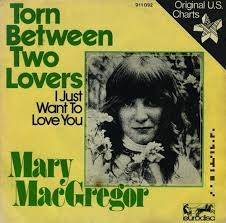
"Torn Between Two Lovers" is a song written by Peter Yarrow and Phillip Jarrell that speaks about a love triangle, and laments that "loving both of you is breaking all the rules". Mary MacGregor recorded it at Muscle Shoals Sound Studio in 1976 and it became the title track of her first album.

"I Won't Last a Day Without You" is a song by The Carpenters with lyrics written by Paul Williams and music composed by Roger Nichols. The writing duo had previously contributed "We've Only Just Begun" and "Rainy Days and Mondays" to the Carpenters.
"Wedding Song (There Is Love)" is a title of a 1971 hit single by Paul Stookey. The song, which Stookey credits to divine inspiration, has since been recorded by many singers (with versions by Petula Clark and Mary MacGregor returning it to the Billboard Hot 100) and remains a popular choice for performance at weddings.
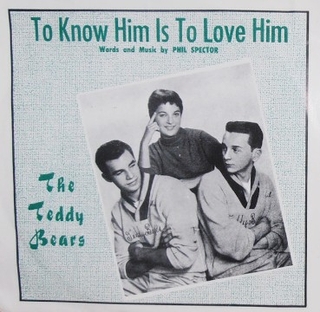
"To Know Him Is to Love Him" is a song written by Phil Spector, inspired by the words on his father's gravestone, "To Know Him Was to Love Him". It was first recorded by the only vocal group of which he was a member, The Teddy Bears. The single spent three weeks at No. 1 on the Billboard Hot 100 chart in 1958, while reaching No. 2 on the UK's New Musical Express chart. Peter & Gordon and Bobby Vinton later each experienced chart success with the song, in 1965 and 1968, respectively.

"I'll Try Something New" is a song written by Smokey Robinson and originally released in 1962 by The Miracles on Motown Records' Tamla subsidiary label. Their version was a Billboard Top 40 hit, peaking at #39, and just missed the Top 10 of its R&B chart, peaking at #11. The song was released later as a joint single by Diana Ross & the Supremes and The Temptations, also becoming a charting version on the Billboard 100 pop singles chart, peaking for two weeks in April 1969 at number 25.
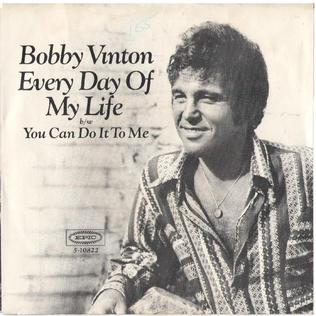
"Ev'ry Day of My Life" is a popular song written in 1954 by Al Jacobs and Jimmie Crane.
"My Boy" is a popular song from the early 1970s. The music was composed by Jean-Pierre Bourtayre and Claude François, and the lyrics were translated from the original version "Parce que je t'aime, mon enfant" into English by Phil Coulter and Bill Martin.
"Arms of Mary" is a song written by Iain Sutherland and performed by Sutherland Brothers and Quiver. It was a 1976 international hit single for the band; the Glasgow Herald in its obituary for Iain Sutherland described "Arms of Mary" as "a plaintive and radio-friendly folk-rock ballad in which the narrator reminisces over the woman he first made love to."

"And When I Die" is a song written by American singer and songwriter Laura Nyro. It was first recorded by the folk group Peter, Paul and Mary in 1966. Nyro released her own version on her debut album More Than a New Discovery in February 1967.
"With Pen in Hand" is a song written by Bobby Goldsboro and first released on his March 1968 album, Honey. The song's lyrics address the subjects of divorce and losing custody of one's child, and are sung from the perspective of the parent who expects to be losing custody of their child, as they make a final plea to their spouse to reconcile before the divorce is finalized. "With Pen in Hand" has been a hit for multiple artists in the late 1960s and 1970s.

"So Sad (To Watch Good Love Go Bad)" is a song written by Don Everly, which was released by The Everly Brothers in 1960. The song was later a country hit for multiple artists in the 1970s and 80s.
This is the discography of American folk group Peter, Paul and Mary.
